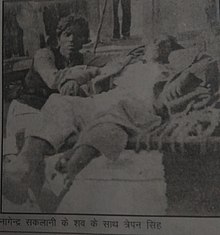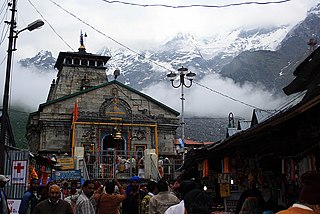
Garhwal is one of the two administrative divisions of the Indian state of Uttarakhand. Lying in the Himalayas, it is bounded on the north by Tibet, on the east by Kumaon, on the south by Uttar Pradesh state, and on the northwest by Himachal Pradesh state. It includes the districts of Chamoli, Dehradun, Haridwar, Pauri Garhwal, Rudraprayag, Tehri Garhwal, and Uttarkashi. The people of Garhwal are known as Garhwali and speak the Garhwali language. The administrative center for Garhwal division is the town of Pauri. The Divisional Commissioner is the administrative head of the Division, and is a senior Indian Administrative Service officer. As the administrative head of the division, the Commissioner is overall incharge of the 7 districts in the Garhwal region of Uttarakhand, and is aided in his duties by an additional commissioner and the district magistrates. Sushil Kumar is the divisional commissioner of the Garhwal Division since December 2021.
New Tehri is a city and a municipal board in Tehri Garhwal District in the Indian state of Uttarakhand. It is the administrative headquarters of Tehri Garhwal District. This urban municipality area has 11 wards, from Vidhi Vihar to Vishwakarma Puram.
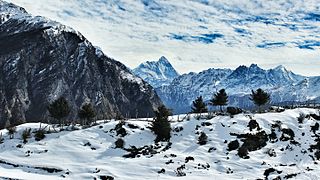
Uttarakhand, formerly known as Uttaranchal, is a state in northern India. The state is bordered by Himachal Pradesh to the northwest, Tibet to the north, Nepal to the east, Uttar Pradesh to the south and southeast, with a small part touching Haryana in the west. Uttarakhand has a total area of 53,483 km2 (20,650 sq mi), equal to 1.6 per cent of the total area of India. Dehradun serves as the state capital, with Nainital being the judicial capital. The state is divided into two divisions, Garhwal and Kumaon, with a total of 13 districts. The forest cover in the state is 45.4 per cent of the state's geographical area. The cultivable area is 16 per cent of the total geographical area. The two major rivers of the state, the Ganges and its tributary Yamuna, originate from the Gangotri and Yamunotri glaciers respectively.
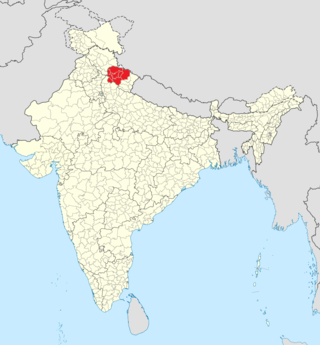
Garhwali is an Indo-Aryan language of the Central Pahari subgroup. It is primarily spoken by over 2.5 million Garhwali people in the Garhwal region of the northern Indian state of Uttarakhand in the Indian Himalayas.
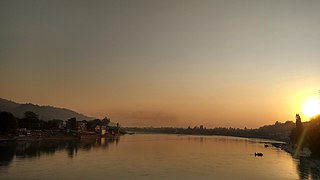
Dehradun district is a district in Garhwal which is a part of Uttarakhand state in northern India. The district headquarters is Dehradun, which has also served as the interim capital of Uttarakhand since its founding in 2000. The district has 6 tehsils, 6 community development blocks, 17 towns and 764 inhabited villages, and 18 unpopulated villages. As of 2011, it is the second most populous district of Uttarakhand, after Haridwar. Dehradun district also includes the prominent towns of Rishikesh, Mussoorie, Landour and Chakrata. The district stretches from the Ganges river in the east to the Yamuna river in the west, and from the Terai and Shivaliks in the south and southeast to the Great Himalaya in the northwest. During the days of British Raj, the official name of the district was Dehra Dun. In 1842, Dun was attached to Saharanpur district and placed under an officer subordinate to the Collector of the district but since 1871 it is being administered as separate district.
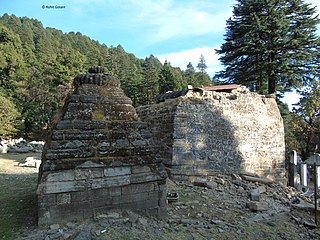
Pauri Garhwal is a district in the Indian state of Uttarakhand. Its headquarters is in the town of Pauri. It is sometimes referred to simply as Garhwal district, though it should not be confused with the larger Garhwal region of which it is only a part of.

Tehri Garhwal is a district in the hill state of Uttarakhand, India. Its administrative headquarters is at New Tehri. The district has a population of 618, 931, a 2.35% increase over the previous decade. It is surrounded by Rudraprayag District in the east, Dehradun District in the west, Uttarkashi District in the north, and Pauri Garhwal District in the south. Tehri Garhwal is a part of the Himalayas.
Lt. Col. Maharaja Manabendra Shah was a member of the 2nd, 3rd, 4th, 10th, 11th, 12th, 13th and 14th Lok Sabha of India. He represented the Tehri Garhwal constituency of Uttarakhand and was a member of the Indian National Congress before joining the Bharatiya Jan Sangh and later the Bharatiya Janata Party (BJP) political party. He became one of the BJP's longest-serving members. Shah was ambassador to Ireland from 1980 to 1983.
Fateh Shah was the Hindu Rajput king of Garhwal, a small kingdom in North India, from 1684 to 1716.
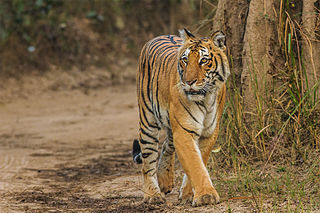
Uttarakhand is a Himalayan state in North India, nestled between the Tibetan Plateau and the Indo-Gangetic Plains. The name, which means "northern land" or "section" or "northern part" in Sanskrit was made popular in the 80s as part of the wider statehood struggle within the region.

The Garhwali people are an Indian ethnolinguistic group native to the Garhwal, in the Indian state of Uttarakhand, who speak Garhwali, an Indo-Aryan language.

Garhwal Kingdom was an independent Himalayan kingdom in the current north-western Himalayan state of Uttarakhand, India, founded in 823 CE by Kanak Pal the progenitor of the Panwar dynasty that ruled over the kingdom uninterrupted until 1803 CE.

Sri Dev Suman, born Sri Dutt Badoni was an Indian anti-monarchy social activist, freedom fighter and writer from the princely state of Tehri Garhwal in British India. Dev Suman is most renowned for his part in inspiring and leading non-violent Gandhian civil rights movements and eventual campaigns demanding the total abolition of the monarchy of Tehri.
Sarola Brahmin, also called Saryul and Serul are Garhwali Brahmins from Uttarakhand, India. Sarola Brahmins were the earliest authenticated and ritually most prestigious Brahmin baronial families in the Garhwal Kingdom 1400 years ago and among the highest ranking and oldest noble lineages from across North India. These houses originated in the 6th and 7th centuries as the sacerdotal aristocracy of the Himalayan Kingdom. The capital of this kingdom was Chandpur Garhi and twelve castes of Brahmins settled in twelve fiefs surrounding the capital. Their twelve ancestral lands were collectively known as "Bara Than" meaning "Barah Sthan", and the Brahmins who owned these estates were known as "Sarola" Brahmins. Over time, the High Brahmins spread their holdings and came to hold vast swathes of the Himalayan Kingdoms as the major landowning class.
Jeet Singh Negi was a music composer, singer, lyricist, writer and director from the Garhwal region of Uttarakhand, India. He is considered to be the father of modern Garhwali folk music.
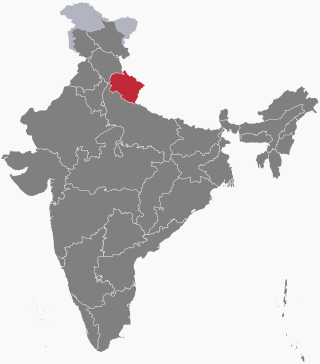
The following outline is provided as an overview of and topical guide to Uttarakhand:
Tara Dutt Gairola, was an Indian lawyer, writer, and editor. He is known as the pioneer of modern Garhwali poetry and for his contribution to Indian folk-lore, specially that of Garhwal, Uttarakhand.
Semwal is one of the thirty-six subcastes of Sarola Brahmin from Uttarakhand. They are the sole custodians and pandits of the Gangotri temple.
Trepan Singh Negi was an Indian politician. He was a member of the 6th and 7th Lok Sabha. He represented the Tehri Garhwal Lok Sabha Constituency and was a member of the Congress political party. He was elected to the 2nd, 3rd, and 4th Uttar Pradesh Assembly from Tehri Assembly Constituency.
Battle of Khurbura or Battle of Khudbuda also known as Gorkha-Garhwal War occurred in May 1804 near modern-day village of Dehradun, Khurbura 30.3256°N 78.0267°E. The battle is regarded as the first major attack in the history of Garhwal Kingdom that triggered between Kingdom of Nepal forces and Maharaja Pradyumna Shah, and continued for 13 days until the Garhwal king was defeated. It is chiefly regarded the only defeat of Pradyumna Shah's life and the victory of Gorkhali forces under Kingdom of Nepal.

